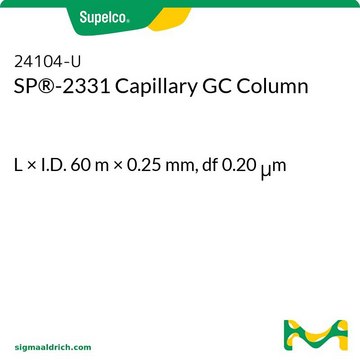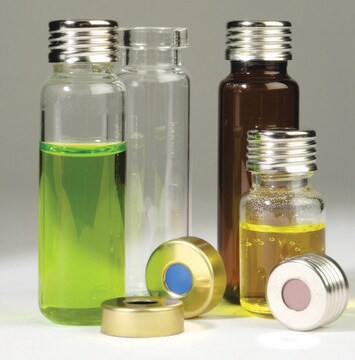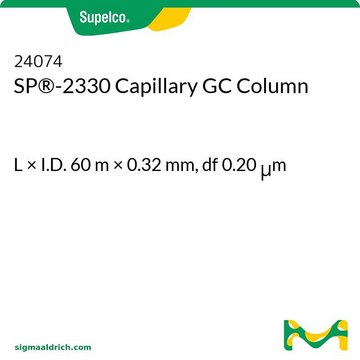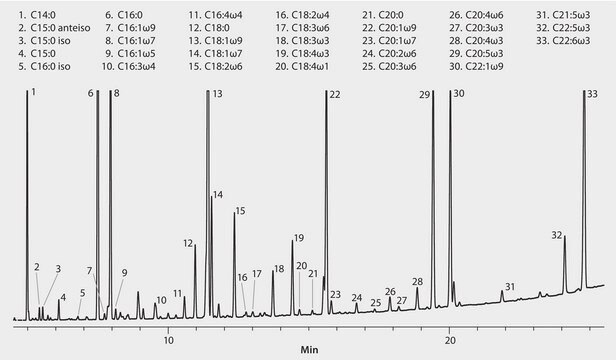24023
SP®-2340 Capillary GC Column
L × I.D. 60 m × 0.25 mm, df 0.20 μm
Sign Into View Organizational & Contract Pricing
All Photos(1)
About This Item
UNSPSC Code:
41115710
eCl@ss:
32119290
Recommended Products
material
fused silica
agency
meets requirements for USP G5
parameter
≤25-250 °C temperature (isothermal or programmed)
Beta value
313
df
0.20 μm
technique(s)
gas chromatography (GC): suitable
L × I.D.
60 m × 0.25 mm
matrix active group
Non-bonded; poly(biscyanopropyl siloxane) phase
column type
capillary highly polar
Looking for similar products? Visit Product Comparison Guide
Related Categories
General description
SP®-2340 is a cyanopropylsiloxane stationary phase, and has high polarity and temperature resistance.
Application: This non-bonded column offers the highest polarity in its class. As with all general purpose biscyanopropyl columns, it is highly effective for both high and low temperature separations of geometric isomers of fatty acid methyl esters (FAMEs), dioxins, carbohydrates, and aromatic compounds.
USP Code: This column meets USP G5 requirements.
Phase:
USP Code: This column meets USP G5 requirements.
Phase:
- Non-bonded
- Poly(biscyanopropyl siloxane)
- Subambient to 250 °C (isothermal or programmed)
Application
Capillary column coated with SP®-2340 stationary phase may be used in gas chromatographic analysis and separation of cis/trans isomeric fatty acids.
Other Notes
We offer a variety of chromatography accessories including analytical syringes
Legal Information
SP is a registered trademark of Sigma-Aldrich Co. LLC
Choose from one of the most recent versions:
Already Own This Product?
Find documentation for the products that you have recently purchased in the Document Library.
Customers Also Viewed
SP 2340 in the glass capillary chromatography of fatty acid methyl esters.
Heckers HF
Journal of Chromatography A, 136 (2), 311-317 (1977)
T W Lee
Journal - Association of Official Analytical Chemists, 70(4), 702-705 (1987-07-01)
A method has been developed for the quantitative determination of linoleic acid in infant formulas by gas chromatography (GC). A known amount of triheptadecanoin was spiked into the sample. Total lipid was extracted from the product by an ethyl ether-petroleum
C F Poole et al.
Journal of chromatography. A, 912(1), 107-117 (2001-04-20)
The solvation parameter model is used to study the influence of temperature and composition on the selectivity of nine poly(siloxane) and two poly(ethylene glycol) stationary phase chemistries for open-tubular column gas chromatography. A database of system constants for the temperature
Mikael Harju et al.
Journal of chromatography. A, 1019(1-2), 111-126 (2003-12-03)
Comprehensive two-dimensional gas chromatography (GC x GC) of the 209 polychlorinated biphenyls (CBs) was carried out using a longitudinally modulated cryogenic system (LMCS) and liquid carbon dioxide as cryogen. The effluent from a non-polar column was modulated and further separated
Waruna Kiridena et al.
Journal of separation science, 30(5), 740-745 (2007-04-28)
The solvation parameter model is used to characterize the separation properties of the polar stationary phases EC-Wax and PAG with a poly(ethylene oxide) backbone (substituted with propylene oxide in the case of PAG) and the cyanopropyl-substituted polysilphenylene-siloxane stationary phase BPX90
Our team of scientists has experience in all areas of research including Life Science, Material Science, Chemical Synthesis, Chromatography, Analytical and many others.
Contact Technical Service









